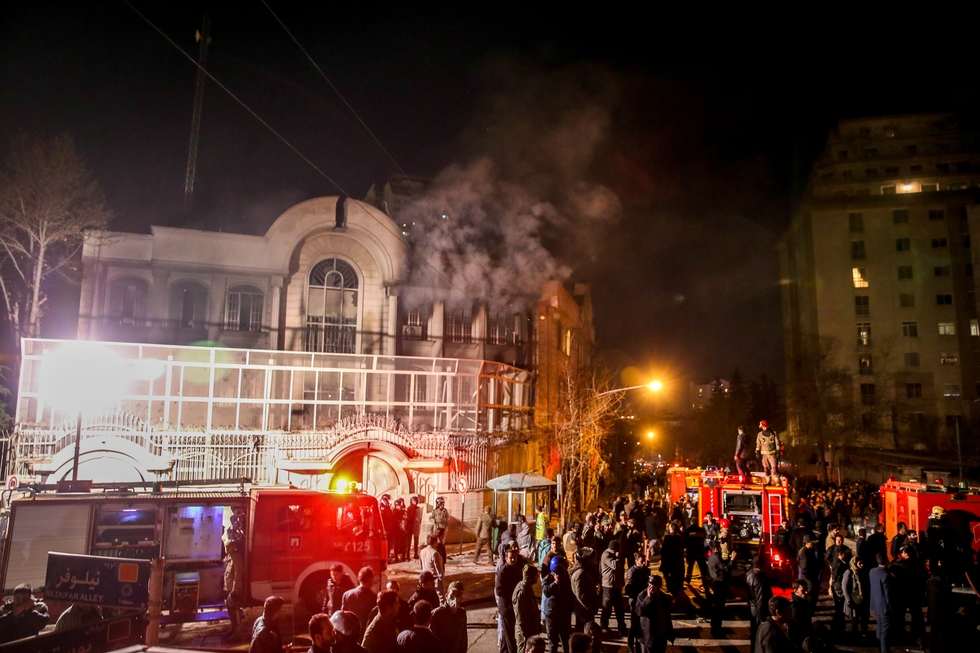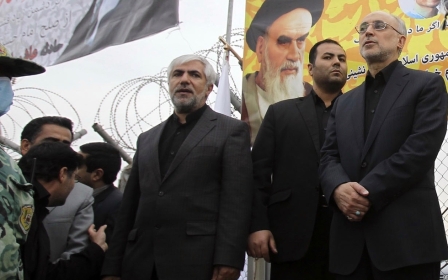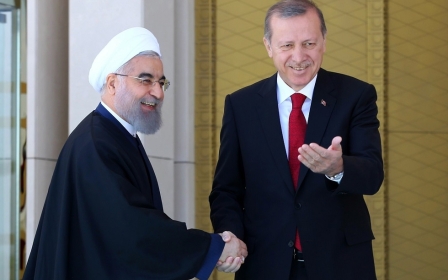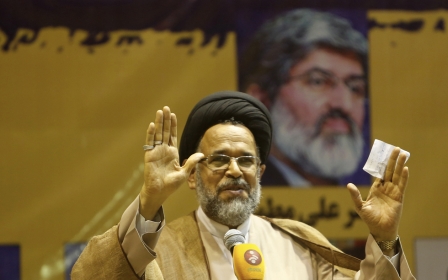ANALYSIS: Iranians confident Saudi Arabia's regional role is declining

TEHRAN - In a booth outside the Saudi embassy in Tehran a lone policeman keeps guard. He hardly needs to bother. There are no diplomats left, and the building is a ruin.
The metal doors on the first-floor balcony of the abandoned villa hang open. The windows’ broken glass has not been replaced, and pigeons now nest inside.
The flagpole is empty and on the front wall an oval-shaped piece of brighter paint shows where the diplomatic crest used to be.
A crowd of more than a thousand Iranian protesters had demonstrated outside the embassy on 2 January. Some threw petrol bombs and set part of it on fire.
Others ransacked the offices, before police arrived and put out the flames. The Saudi staff escaped injury and shortly after, Saudi Arabia broke diplomatic relations that have not yet been restored.
The protesters were furious with the execution in Saudi Arabia of a prominent opposition figure, the Shia cleric Nimr al-Nimr. Iran’s Supreme Leader Ayatollah Ali Khamenei condemned the execution but also denounced the embassy attack. A spokesman for Iran’s judiciary announced three weeks later that about 100 people had been arrested. Some were later released.
In spite of the ending of official contacts between the two countries and continuing anger over the cleric’s execution, Iranian analysts seem remarkably relaxed today about Saudi’s regional role. They feel it is declining.
They might think this Salman doctrine is a good idea but the region is not in a mood for offensives
- Kayhan Barzegar, Institute for Middle East Strategic Studies
In May 2015 Deputy Crown Prince Mohammed bin Salman, widely seen as the strongman behind the Saudi throne, had been in power only four months as defence minister. He had just taken the gamble of launching a Saudi military intervention and a bombing campaign in Yemen.
The Iranian media were full of accounts of Saudi air strikes killing and maiming civilians. Banners on Tehran’s main streets denounced Saudi aggression. Senior officials criticised Saudi actions as worse than Israel’s.
Now the mood is different. Although coverage of the war in Yemen is still a staple item on TV news, analysts and officials exude a tangible confidence that bin Salman has bitten off more than he can chew. They see the nuclear deal with the United States and its UN Security Council partners as a regional game-changer that has isolated Saudi Arabia.
They also feel the war-tide in Syria is turning favourably as their ally Bashar al-Assad seems to be gaining military ground over Saudi-supported rebel groups. Saudi Arabia’s ally Turkey has started to lessen its hostility to Assad.
“The Saudis are using old-fashioned concepts to make the so-called Iranian threat the main issue for legitimising their policy, but the age for this has past. They might think this Salman doctrine is a good idea but the region is not in a mood for offensives,” Kayhan Barzegar, the director of the Institute for Middle East Strategic Studies, told Middle East Eye.
Know your limits
Barzegar’s basic concept, which he applied to Turkey and his own country, was that states can’t act beyond their capacities, at least not for long.
Iran had to make a deal with the US, Turkey had to make one with Russia after mistakenly thinking it could challenge Vladimir Putin by shooting down a Russian fighter-bomber last autumn.
The same was true for Saudi Arabia.
“They might think they can bring America to be anti-Iran in the region again but it won’t happen, especially at a time when Russia and China are developing their relations with Iran,” he said.
The war in Yemen is going badly for Saudi Arabia. The Houthi forces which they are trying to defeat are on Yemen’s northern border with Saudi Arabia, shelling the Saudi town of Najran as well as oil facilities.
“The Saudis need to compromise in Yemen. I’m not saying the Iranians want them to lose but time will adjust Saudi policy just as time adjusted Turkey’s,” he said.
Some Iranians would like to take a robust response to Saudi provocations but this would be risky, according to Foad Izadi, a professor in the Faculty of World Studies at Tehran University.
“There is disagreement over how much Iran should give way to Saudi aggression but picking a fight with Saudi Arabia will be costly and not lead to anything," he said.
"Unfortunately it’s not seen in the same way on the Saudi side. Salman seems to have no limit on how much he wants to push Iran. This is pushing some people in Iran to reconsider."
But the stakes are high. Iran’s oil facilities are in the south and Saudis are in the east, both relatively near each other.
“They could both quickly be destroyed in a hot war,” he added.
The best hope is that people in Saudi Arabia will rethink. There is increasing disagreement in Saudi Arabia over Salman’s policy in Yemen as it is seen to be failing.
'Suicide by foreign policy'
Heshmatollah Falahatpisheh, a member of the Iranian parliament’s national security and foreign affairs committee, is considered an outspoken conservative. He too feels time is on Iran’s side.
“Saudi Arabia is a great country in the Muslim world. But in my opinion, they are now afflicted with suicide in foreign policy,” he said in an interview.
He pointed to the position of Iran’s Supreme Leader Ayatollah Ali Khamenei.
“If you pay attention to the supreme leader’s positions addressing Saudi Arabia, you will see that he constantly advises Saudi Arabia to leave this suicidal path and advises their young leaders and in fact new leaders to get into Islamic interactions and to moderate their behaviour. I believe that the supreme leader’s advice to Saudi officials is brotherly and fatherly advice.”
Saudi Arabia’s rulers are worried by the demands for democracy which have spreading across the Gulf region from Yemen to Bahrain, the MP added.
“Usually, when reactionary systems confront democracy-seeking, the first thing that they do is to attack advanced systems. So they attack the Islamic Republic of Iran more as an advanced system,” he said.
Saudi Arabia... in my opinion, are afflicted with suicide in foreign policy
- Heshmatollah Falahatpisheh, MP
For its part the Iranian government is taking a wait-and-see position on Saudi Arabia. It vigorously denies claims that it is arming the Houthis in Yemen, a charge made recently by US Secretary of State, John Kerry, on a visit to Riyadh.
Contrary to US policy, Iran supports the provisional government, known as the governing council, which was established in the capital Sanaa last week by the Houthis and representatives of former Yemeni president, Ali Abdullah Saleh.
Javad Zarif, Iran’s foreign minister, has offered to go to Riyadh to restore relations but the Saudis have rejected his overtures.
“Currently, there are no negotiations between the Saudis and us. We only trade opposing remarks," Ali Shamkhani, the secretary of Iran’s Supreme National Security Council, told the TV channel Russia Today last week.
"We see the Saudis acting irrationally. They have started a media hype against us and keep accusing us. We shut the door of dialogue with no country except the occupying regime of Israel."
This article is available in French on Middle East Eye French edition.
New MEE newsletter: Jerusalem Dispatch
Sign up to get the latest insights and analysis on Israel-Palestine, alongside Turkey Unpacked and other MEE newsletters
Middle East Eye delivers independent and unrivalled coverage and analysis of the Middle East, North Africa and beyond. To learn more about republishing this content and the associated fees, please fill out this form. More about MEE can be found here.




